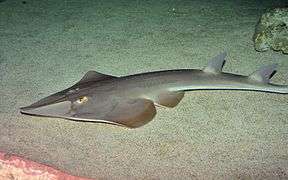Rhinopristiformes
Rhinopristiformes is an order of rays, cartilaginous fishes related to sharks, containing shovelnose rays and allied groups.[1][2][3][4]
| Rhinopristiformes | |
|---|---|
 | |
| Common guitarfish (Rhinobatos rhinobatos) | |
| Scientific classification | |
| Kingdom: | |
| Phylum: | |
| Class: | |
| Subclass: | |
| Superorder: | |
| Order: | Rhinopristiformes Naylor, et al., 2012 |
Families
- Family Glaucostegidae (giant guitarfishes)
- Family Pristidae (sawfishes)
- Family Rhinidae (wedgefishes)
- Family Rhinobatidae (guitarfishes)
- Family Trygonorrhinidae (banjo rays)
- Additional families
Two additional families are associated with the order but their phylogenetic relationships have not been fully resolved:
- Family Platyrhinidae (fanrays) [5]
- Family Zanobatidae (panrays) [5][6][7]
Characteristics[8]
Species in the order Rhinopristiformes generally exhibit slow growth, late maturity, and low fecundity. Alone or in combination, such features cause fishes in this group to be susceptible to extinction.
Threats[8]
Rhinopristiformes are more prone to being caught in many different types of fishing equipment. These include the following:
- trawl
- gillnet
- seine net
- hook-and-line
They are caught for their meat but most importantly their fins. While the meat is mostly consumed locally the white fins are a delicacy and highly sought after. They are the most valuable part of Rhinopristiformes therefore their fins are in high demand. Both the combination of overfishing and the high desire for their fins the Rhinopristiformes population is depleting rapidly
References
- Peter Last; William White; Marcelo de Carvalho; Bernard Séret; Matthias Stehmann; Gavin Naylor, eds. (2016). Rays of the World. CSIRO. ISBN 9780643109148.
- Naylor, G.J.P.; Caira, J.N.; Jensen, K.; Rosana, K.A.M.; Straube, N.; Lakner, C. (2012). Carrier, J.C.; Musick, J.A.; Heithaus, M.R. (eds.). Elasmobranch Phylogeny: A Mitochondrial Estimate Based on 595 Species. Biology of Sharks and Their Relatives (2 ed.). CRC Press, Boca Raton, Florida. pp. 31–56.
- Last, P.R.; Séret, B.; Naylor, G.J.P. (2016). "A new species of guitarfish, Rhinobatos borneensis sp. nov. with a redefinition of the family-level classification in the order Rhinopristiformes (Chondrichthyes: Batoidea)". Zootaxa. 4117 (4): 451–475. doi:10.11646/zootaxa.4117.4.1. PMID 27395187.
- "WoRMS - World Register of Marine Species - Rhinopristiformes". www.marinespecies.org. Retrieved 2018-08-31.
- Aschliman; Nishida; Miya; Inoue; Rosana; Naylord (2012). "Body plan convergence in the evolution of skates and rays (Chondrichthyes: Batoidea)". Molecular Phylogenetics and Evolution. 63 (1): 28–42. doi:10.1016/j.ympev.2011.12.012.
- Naylor, G.J.P.; Caira, J.N.; Jensen, K.; Rosana, K.A.M.; Straube, N.; Lakner, C. (2012). Carrier, J.C.; Musick, J.A.; Heithaus, M.R. (eds.). Elasmobranch Phylogeny: A Mitochondrial Estimate Based on 595 Species. Biology of Sharks and Their Relatives (2 ed.). CRC Press, Boca Raton, Florida. pp. 31–56.
- Last, P.R.; Séret, B.; Naylor, G.J.P. (2016). "A new species of guitarfish, Rhinobatos borneensis sp. nov. with a redefinition of the family-level classification in the order Rhinopristiformes (Chondrichthyes: Batoidea)". Zootaxa. 4117 (4): 451–475. doi:10.11646/zootaxa.4117.4.1. PMID 27395187.
- Jabado R.W. "The Fate of the Most Threatened Order of Elasmobranchs: Shark-like Batoids (Rhinopristiformes) in the Arabian Sea and Adjacent Waters". Fisheries Research. 204: 448–457. doi:10.1016/j.fishres.2018.03.022.